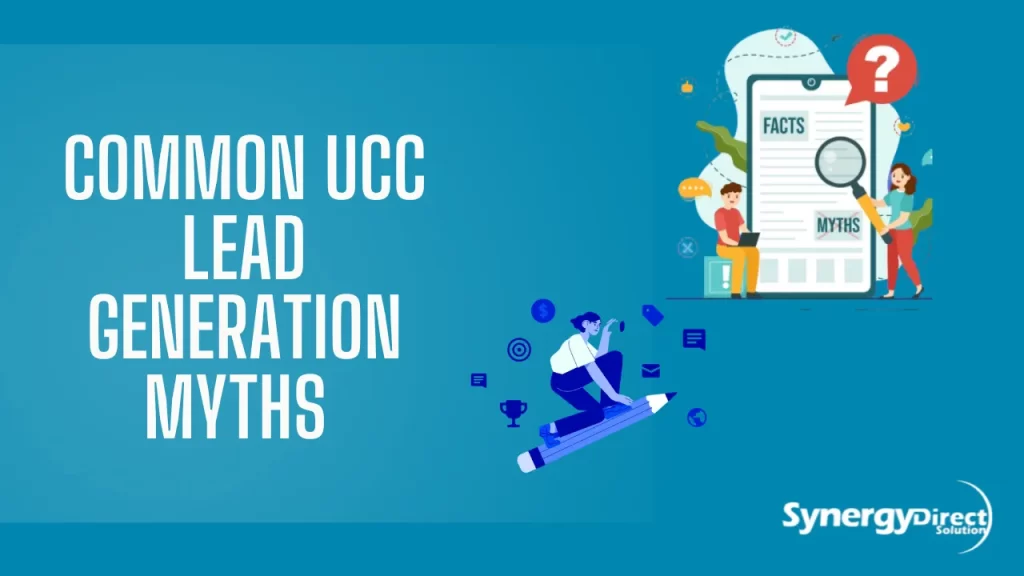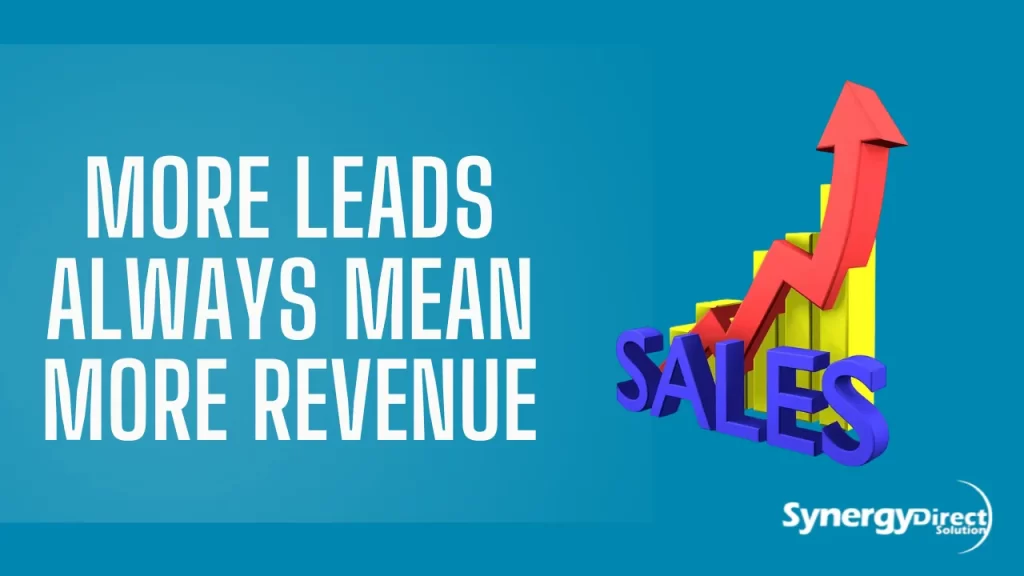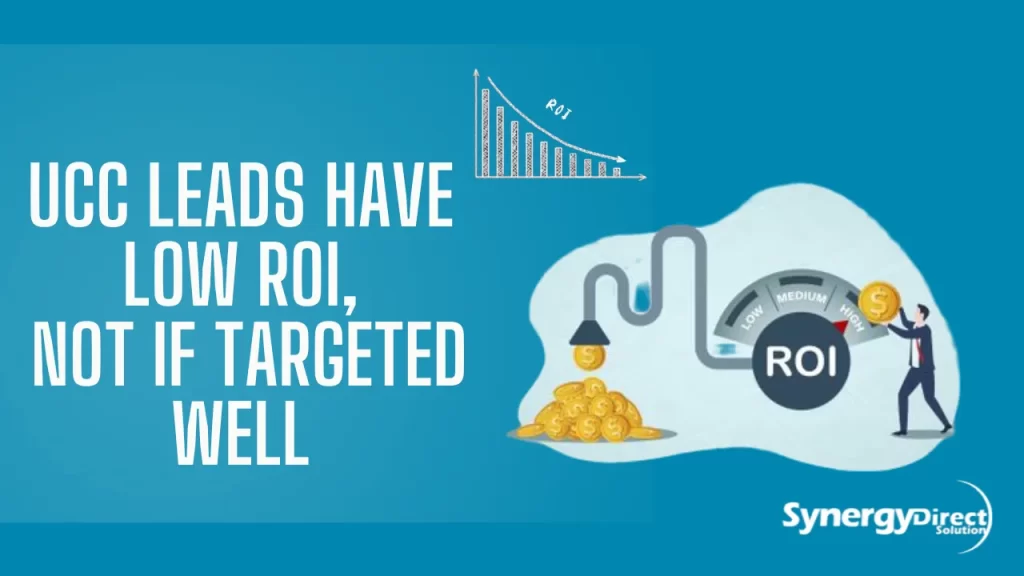Common UCC Lead Generation Myths
In today’s competitive financial services landscape, UCC (Uniform Commercial Code) lead generation has become a valuable tactic for lenders, factoring companies, and business development professionals seeking to connect with businesses in need of funding. Despite its effectiveness, a range of myths and misconceptions continue to circulate around the UCC lead generation process. These myths often prevent organizations from leveraging UCC data to its full potential.
In this article, we’ll explore and debunk the most common UCC lead generation myths, provide factual insight into the process, and equip you with the knowledge you need to make informed, ROI-driven decisions.

What Are Common UCC Lead Generation Myths?
Lead generation is a critical function for any business that wants to scale, but it’s also an area riddled with misunderstandings. These myths often lead to poor strategies, missed opportunities, and unrealistic expectations. Let’s debunk some of the most common false myths about lead generation businesses to help you better understand how they actually work and where the true value lies.
1. All Leads Are the Same
False! One of the biggest myths is that a lead is a lead — no matter where it comes from. In reality, not all leads are created equal. Some are warm and ready to buy, while others are cold and need significant nurturing. Lead generation businesses understand this and use targeting techniques to deliver leads that align with a company’s ideal customer profile (ICP). Expecting all leads to convert equally sets the stage for disappointment.
2. Lead Generation Guarantees Sales
Another myth. A lead is just the beginning of a sales journey — not a guaranteed customer. Lead generation businesses provide potential contacts, but it’s the responsibility of the sales team to follow up, build relationships, and close deals. Without proper nurturing, even high-quality leads can go cold.
3. Lead Generation Is Only for Big Companies
Not true. Many small and medium-sized businesses (SMBs) benefit immensely from outsourced lead generation services. These services help smaller companies compete with larger firms by filling their pipeline with targeted opportunities, without the need for a full in-house sales team.
4. More Leads Always Mean More Revenue
Quantity doesn’t always equal quality. A high volume of unqualified leads can waste time and drain resources. Successful lead generation is about finding the right leads — businesses or individuals who fit your buyer profile and show intent to buy. Targeted lead generation services focus on quality over quantity, optimizing conversion rates.

5. All Lead Gen Companies Use the Same Strategy
False. There is no one-size-fits-all method in lead generation. Reputable lead gen companies customize their approach based on your industry, goals, and customer base. Some focus on inbound strategies (SEO, content marketing), while others specialize in outbound (cold calling, email outreach). Choosing a provider that understands your market is essential for success.
6. UCC and Public Data Are Too Generic to Be Useful
Totally wrong. Public records like UCC filings are often dismissed as too broad or impersonal. In reality, they offer real-time insights into a business’s financial activity — a powerful indicator of need or intent. Lead generation businesses that know how to interpret and filter this data can create precise, highly targeted prospect lists.
7. Lead Generation Is Expensive and Not Worth It
This myth misses the bigger picture. While lead generation services do come at a cost, they often reduce your customer acquisition costs over time by targeting only qualified leads. When done right, it’s a scalable investment with clear ROI. Plus, outsourcing can be more cost-effective than building a full internal team.
8. Any Sales Team Can Handle Leads Without Outside Help
Not always. Many internal sales teams are overwhelmed or lack the resources to consistently prospect, qualify, and nurture leads. Lead generation companies specialize in these tasks, allowing your sales team to focus on closing deals instead of chasing cold contacts.
9. Buying Leads Is the Same as Lead Generation
Big myth. Buying static, outdated lead lists is not the same as generating leads through strategy and research. Quality lead generation involves real-time data, personalized outreach, and a clear sales funnel. Purchased lists often lack context and are riddled with inaccuracies.
10. Lead Generation Is Only About Cold Outreach
Far from it. Today’s lead generation strategies include a mix of inbound and outbound tactics. Content marketing, SEO, paid ads, webinars, social selling, and referral programs all play a role in attracting and converting leads. A modern lead generation business leverages multiple channels to build a diverse pipeline.
UCC data is too old — Myth Debunked
One of the most persistent myths in lead generation, especially within financial services and B2B marketing, is that UCC (Uniform Commercial Code) data is outdated or no longer relevant. This misconception often causes marketers and sales professionals to overlook a valuable source of highly targeted leads. In reality, UCC data is updated regularly and maintained by state filing offices, ensuring its accuracy and timeliness.
Every time a business takes out a loan secured by personal property, a UCC filing is made. These filings are not static; they are actively maintained, amended, or terminated as businesses grow, repay debts, refinance, or undergo structural changes. As such, UCC data reflects the dynamic nature of business financing.
More importantly, UCC filings provide a unique glimpse into a company’s purchasing behavior and financial commitments — insights that are not typically found in standard lead lists. For instance, a recent UCC filing indicates that a business has recently acquired equipment or taken a loan, which may signal expansion, cash flow needs, or readiness for additional financial services. These indicators are time-sensitive, and savvy marketers use them to target businesses precisely when they are most receptive to offers such as refinancing, leasing, or business loans. Far from being obsolete, UCC data is a goldmine for those who understand how to interpret and act on it.
In today’s data-driven world, the key to success lies not in questioning the freshness of UCC data, but in understanding how to strategically leverage it. With the right filters and tools, businesses can identify newly filed UCC leads within days of their appearance in public records, enabling fast, proactive outreach. Therefore, the myth that UCC data is too old is not just inaccurate — it’s a missed opportunity for those who fail to see its true value.
Only Lenders Use UCC — False!
It’s a common misunderstanding that UCC (Uniform Commercial Code) filings are solely useful for lenders and financial institutions. While it’s true that lenders are the ones who typically file UCC documents to secure their interest in collateral, the idea that they are the only ones who benefit from UCC data is completely false. In reality, businesses across a wide range of industries — including marketing, leasing, insurance, equipment sales, and business consulting — actively use UCC filings as a powerful tool for lead generation and market intelligence.
UCC data offers valuable insights into a business’s financial behavior, creditworthiness, and purchasing activity. For example, if a UCC filing shows that a company has recently taken out a loan to purchase manufacturing equipment, that’s a strong indication that the business is growing or upgrading — a perfect opportunity for equipment maintenance services, software providers, or business consultants to pitch their services. Similarly, insurance brokers can use this information to approach companies that might need new or updated policies to cover recently financed assets.
Beyond that, UCC filings help identify businesses that are already open to external financing and vendor relationships — a signal that they are active, credit-using entities willing to invest in growth. This is a dream scenario for sales teams in industries such as commercial real estate, logistics, and B2B services. With the right filters, businesses can segment UCC data by location, industry, loan amount, and type of equipment financed, allowing them to craft hyper-targeted outreach campaigns.
In short, while lenders initiate UCC filings, the data itself has a broad range of applications beyond just banking. Ignoring UCC data because of the myth that “only lenders use it” means leaving warm, high-intent leads on the table. It’s time to see UCC data for what it truly is — a smart, strategic resource for any business looking to connect with companies in a growth or transition phase.
UCC Leads Have Low ROI — Not If Targeted Well
Another common misconception about UCC lead generation is that it delivers a low return on investment (ROI). This myth usually stems from experiences where businesses purchased generic UCC lists without proper segmentation or strategy. The truth is, UCC leads can yield exceptionally high ROI — if they are targeted well and approached with precision.
The power of UCC data lies in its specificity. Each filing includes valuable information such as the borrower’s name, business address, the type of equipment or assets financed, the lender involved, and the date of the transaction. When used strategically, this data allows businesses to identify companies that have recently made financial commitments — a strong signal of intent and activity. This timing gives marketers and sales teams an edge in reaching out when the prospect is most open to new opportunities, such as refinancing, leasing additional equipment, or purchasing complementary services.

ROI suffers when UCC leads are treated as generic contact lists rather than as a dynamic data set that requires filtering and contextual analysis. For example, a company selling logistics software may only want to target businesses that have filed UCCs for transportation equipment in the last 90 days. With proper targeting, they’re not wasting time or resources on cold prospects, but instead speaking directly to companies that likely have an immediate need for their product.
Moreover, modern lead generation tools and CRM integrations have made it easier than ever to automate the process of identifying, tracking, and engaging high-value UCC leads. Pairing UCC filings with demographic filters — such as location, industry, company size, or type of collateral — significantly boosts lead quality. High-intent, highly-targeted leads naturally yield better conversions and higher ROI.
You Can’t Access UCC Data — Here’s How You Can
A widespread myth in the world of business development and sales is that UCC (Uniform Commercial Code) data is difficult or impossible to access unless you’re a lender or a legal expert. In truth, UCC filings are public records and are legally accessible to anyone who knows where and how to look. The real challenge lies not in accessing the data itself, but in knowing how to extract, interpret, and use it effectively for lead generation and outreach.
Every state in the U.S. maintains a UCC filing system — typically through its Secretary of State’s office. These records are available online through official state portals. By simply visiting a state’s business services website, you can search for UCC filings by debtor name, filing number, or even the secured party (the lender). Some states provide basic search functions for free, while others may charge a nominal fee or offer premium access options for bulk data downloads.
For those looking to use UCC data consistently and at scale, third-party UCC data providers offer aggregated, filtered, and cleaned databases for a fee. These platforms make it easier to sort through massive volumes of filings and segment leads by industry, filing date, loan type, location, and more. Advanced platforms also provide CRM integration, alerts for new filings, and export features that allow for seamless campaign execution. This level of access and usability transforms raw data into targeted sales intelligence.
It’s important to note that while UCC data is public, manually collecting and analyzing it can be time-consuming. That’s why many growth-oriented businesses turn to specialized lead generation services or software that automate the retrieval and filtering of relevant filings. These tools offer scalable access to real-time UCC information without requiring technical expertise.
So, the myth that UCC data is off-limits or inaccessible is entirely false. Whether you’re a small business owner, marketer, or sales professional, you can access and use UCC data — you just need the right tools and strategy to harness its potential.
Conclusion
False myths about lead generation businesses — especially those surrounding UCC data — can lead to missed opportunities, lower ROI, and poor strategy execution. In truth, when properly understood and applied, UCC lead generation provides highly targeted, real-time insights that fuel scalable, strategic growth. Don’t let outdated assumptions hold your business back — embrace the data, apply smart filters, and unlock UCC’s full potential.
